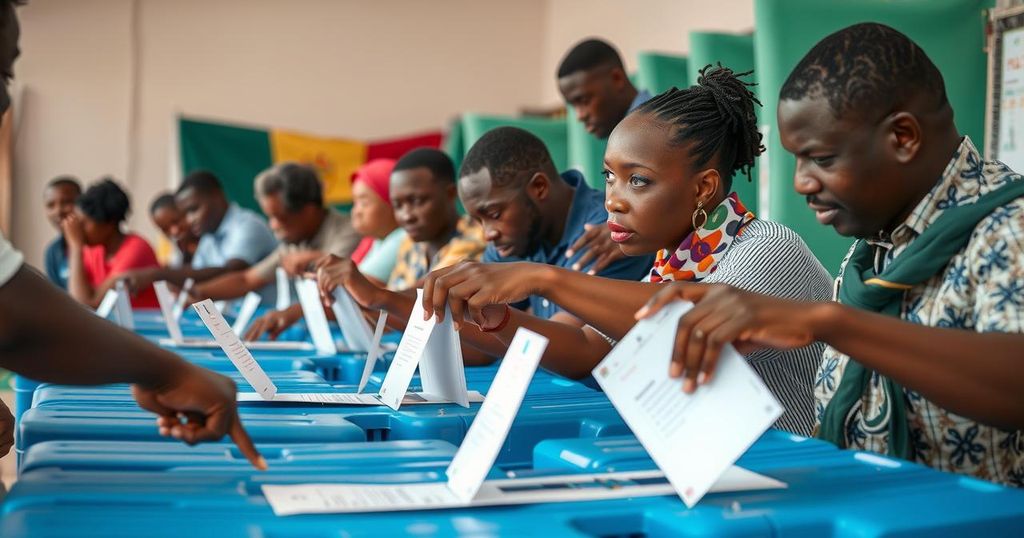World news
ACCRA, AFRICA, AKUFO - ADDO, BAWUMIA, DEMOCRACY, ELECTION, ELECTORAL PROCESS, GHANA, GOVERNANCE, GOVERNMENT, INTERIOR MINISTRY, JAMES NSIAH, JAMESTOWN, JOHN MAHAMA, MAHAMUDU BAWUMIA, NANA AKUFO - ADDO, NATIONAL DEMOCRATIC CONGRESS, NDC, NORTH AMERICA, NPP, OPPOSITION, UNITED STATES, WEST AFRICA
Amira Khan
0 Comments
Ghana Faces Critical Elections Amid Economic Challenges
Ghana’s presidential elections feature Vice President Mahamudu Bawumia and former President John Mahama amid economic distress. The ruling NPP seeks a third term while the NDC aims for a return to power, focusing on economic recovery following a significant crisis. Both candidates are vying for votes in a national climate fraught with high inflation and public dissatisfaction over the economy.
On Saturday, Ghanaians participated in a pivotal presidential election, with Vice President Mahamudu Bawumia and former President John Mahama as the leading contenders. This election comes in the wake of a severe economic crisis marked by a debt default and rising inflation, compelling citizens to seek economic recovery. As President Nana Akufo-Addo prepares to step down after two terms, the focus is on addressing pressing economic challenges. The ruling New Patriotic Party (NPP) hopes to secure an unprecedented third term while the opposition National Democratic Congress (NDC) aims for a return to governance. Early voting results are anticipated shortly after the polls close, reflecting the citizens’ urgent wish for a stable economic future.
Economic conditions have heavily influenced the electoral landscape, as many Ghanaians voice dissatisfaction over their financial stability, exacerbated by rising living costs and increasing unemployment rates. The NPP’s Bawumia promotes a message focused on a recovering economy and digital advancements, yet struggles with the legacy of the current administration’s economic management. In contrast, Mahama has vowed to establish a ’24-hour economy’ to boost productivity and employment, although his previous administration’s financial difficulties remain a concern among voters.
Both candidates hail from northern Ghana, traditionally a stronghold for the NDC, making the region a key electoral battleground. Illegal mining practices have also surfaced as contentious issues, posing significant threats to the environment and agricultural sectors. Ultimately, the outcome of the election could shape Ghana’s economic trajectory in the years to come.
Ghana’s election on Saturday represented a critical juncture—a fight for leadership in a nation grappling with significant economic challenges. With both primary candidates furthering their visions for governance, the electorate’s choice will heavily influence the country’s future prosperity and stability. The need for quick results highlights the electorate’s eagerness for positive change in the wake of a tumultuous economic landscape.
Ghana, West Africa’s second-largest cocoa producer and a notable gold exporter, has recently encountered substantial economic challenges, including a major debt default and soaring inflation. The country’s political landscape is characterized by a history of alternating power between two primary parties, the New Patriotic Party (NPP) and the National Democratic Congress (NDC), since 1992. This election comes at a time when economic recovery is of utmost concern, following the government’s negotiations for a $3 billion IMF bailout.
The 2023 presidential elections in Ghana are pivotal for determining the future direction of the country amidst economic hardship. With major candidates advocating differing visions for recovery, the electorate’s choice will greatly influence policy direction and economic management moving forward. As Ghanaians hope for transformational leadership, the upcoming results will reflect their aspirations for improved stability and prosperity.
Original Source: www.france24.com




Post Comment